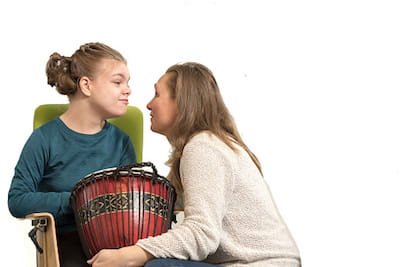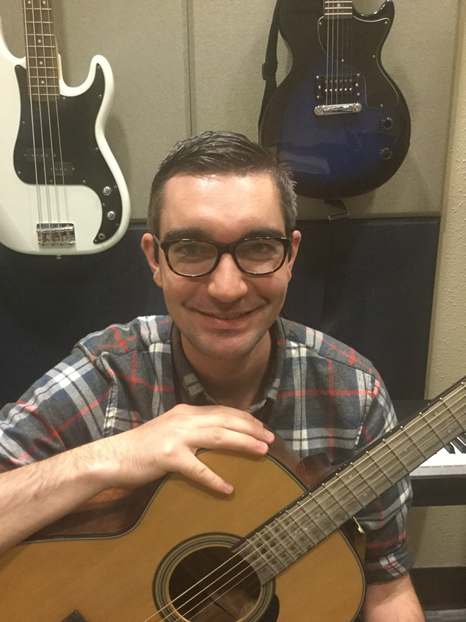Is your child with autism spectrum disorder entitled to music therapy services?
If you have a child with autism, you may find they are especially in tune with certain elements of music like rhythm, harmony, melody, and pitch. Individuals with autism spectrum disorder (ASD) often demonstrate exceptional skills in music. In fact, many musical skills that are rare within the general population are more common in those with ASD. Examples include incredible accuracy in singing or playing musical notes, the ability to recall melodies with great accuracy, and the ability to name musical notes without any reference to a musical instrument.
How children with autism can benefit from music therapy
ASD is a serious neurodevelopmental disorder that impairs a child’s ability to communicate and interact with others. Some of the hallmarks of the disorder include deficits in communication and social skills such as difficulty making eye contact, reduced sharing of emotions, and difficulty developing, maintaining, and understanding relationships. Those with ASD may have restricted and repetitive patterns of behavior, interests, or activities, such as being hypersensitive or hyposensitive to certain sounds/smells/textures, persistent hand flapping or rocking, and difficulty deviating from routines. Music therapy is a profession that offers a unique treatment to help children with ASD work through some of these challenges and succeed in school. Plus, for individuals with ASD that resonate deeply with music and its qualities, using music during treatment makes a lot of sense.
Music therapy services are provided for children with ASD in schools, outpatient centers, and individuals’ homes all across the country. Music therapists focus on individualizing treatment sessions based on a person’s preferences, family values, beliefs, and priorities. Music therapists create a plan of care and utilize interventions with musical elements to address social, communication, motor/sensory, emotional, and academic/cognitive functioning in those with ASD. Music therapy interventions with ASD have shown to significantly improve communication and interpersonal skills, enhance auditory processing, help individuals identify and express emotions, increase social involvement, and teach new skills. Music therapy has a rich history, with pioneers of music therapy working with children with autism in the 1940s at the same time the term autism was coined. In fact, music therapists have been working with children with autism even before autism was consistently used as a diagnostic term within the medical community.
What you can do to obtain music therapy services
Many people don’t realize that music therapy, much like occupational therapy, physical therapy, audiology, and speech-language pathology, is considered a related service under the Individuals with Disabilities Education Act (IDEA). IDEA is a federal law that ensures children with disabilities receive an education that is tailored to their needs. IDEA governs how states and public agencies provide services to these children. Children with disabilities, including those with ASD who receive special education, are entitled to an Individual Education Program (IEP). An IEP is a plan developed for a child to help them achieve key educational milestones. IEPs can look different depending on the state. All IEPs address key components such as:
- The student’s current performance in school
- The special education and related services they require
- When services start, where they will take place, and for how long
- Tracking of educational progress with measurable outcomes

IEPs are created and monitored by teams which include parents, school administrators, related service personnel, and students (when appropriate). This IEP team works together to guide the delivery of special education, create educational goals, and seek out related services a child may need.
While music therapy intervention may be essential for many children with disabilities, obtaining music therapy as a related service takes initiative just like advocating for any other related service. First, a student who receives special education must receive a referral for music therapy services from the IEP team. A music therapist already in the school or in the community can be contacted. If unclear if a referral should be made, music therapists can provide questionnaires or checklists to the IEP team to help personnel determine a student’s eligibility for music therapy assessment. Next, the music therapist must receive formal permission and consent from the student’s guardians in order to assess the student. The music therapist will then have 60 days to complete an assessment with the student and present the results to the IEP team.
If it is determined that music therapy is a necessary service, then the music therapist can be included on the IEP team and involved in writing IEP goals. New goals can be written specifically related to the student’s participation in music therapy services, or music therapists can address pre-existing IEP goals. The music therapist will create goals that are specific, measurable, attainable, and realistic. Once goals are approved by the IEP team and included on the IEP, the music therapist can begin working with the student, addressing the IEP goals, and reporting progress to the IEP team.

Music therapy services may be necessary for children with other disabilities besides ASD. However, music therapy is especially relevant to the treatment of children with ASD, due to the rich history of music therapy with this population, substantial research supporting the use of music therapy with ASD, and the growing prevalence of ASD in general. Music therapy is a clinical and evidence-based practice with a focus on using music interventions and the development of therapeutic relationship to address individualized treatment goals. Although music therapy may not currently be a part of your child’s IEP, it is within your rights to advocate for and refer any related services that may be necessary to the educational success of your child.
Something else to keep in mind is that children with developmental disabilities may qualify for music therapy at home or in the community through Medicaid Home and Community Based Services Waivers. The Individual Budget Waiver (iBudget) is the program in Florida that the Agency of Persons with Disabilities (APD) uses to manage Medicaid waivers for people with developmental disabilities. The APD Resource Directory is an online tool where you can search for music therapy in your local area.
Children with ASD deserve quality care and necessary intervention to succeed in school. Music therapy may be an important and necessary service.







